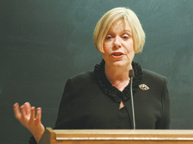Not rocket science
Religious scholar Karen Armstrong offers ancient advice for modern times

Having fled a British convent in 1967 after five years of service, Karen Armstrong earned the nickname 'The Runaway Nun'.
Owen Egan
What would sages of the ninth century BC say about global warming and suicide bombers? Can philosophers who never saw electricity or even a bicycle offer sound advice on nuclear weapons, the greenhouse effect or 9/11?
"Certainly," Karen Armstrong told a packed house at McGill on April 27. A former nun turned religious scholar, Armstrong is world-renowned for connecting past, present and future, as she does in her most recent book, The Great Transformation: the Beginning of Our Religious Traditions.
In China, India, Israel and Greece, during what was known as the Axial Age (circa 900 to 200 BC), social change prompted major spiritual developments. The movement toward city life, industrial and agricultural revolutions, and the introduction of iron weapons — more lethal than any yet seen — sparked the development of traditions that nourish humanity to this day: Hinduism, Buddhism and Jainism in India; Confucianism and Daoism in China; monotheism in Israel; and philosophical rationalism in Greece.
According to Armstrong, Axial Age spirituality offers a solution for the frightening problems of our modern age. "The great discovery of the Axial Age is that the divine can be found in the core of everyone, and so everyone is sacred."
Confucius was the first to develop the Golden Rule in 500 BC. Five hundred years later, Rabbi Hillel, a contemporary of Jesus, would summarize the Torah as, "Do unto others as you would have done to you. The rest is commentary." Jesus advised his followers to love their enemies. All religions have a version of the Golden Rule.
"It's a perfectly practical solution because it's not rocket science. People just don't want to practice it because they prefer to have a weekly uplift from religion and then go back to their regularly scheduled lives, unscathed."
At least one audience member smelled danger in turning to religion to resolve problems, when religion itself is the cause of so many conflicts.
Armstrong disagreed. "Some people do religion badly, just like some people cook badly. Sex can be done badly, too, but that doesn't make sex bad." It is incompetence, rather than religion itself, that is detrimental. Politicians who use religion in their platforms are not necessarily excellent examples of religious sentiment. As for religion's role in conflicts, violence begets violence, which then affects everything, including religion. Violent disasters are not limited to religious conflicts: Hitler's and Stalin's massacres were secular.
Despite her belief in the importance of religion, Armstrong's latest book critiques its present-day practice. Very often, religious communities are more interested in dogma than compassion. "What's the fun of being religious if you can't disapprove of others?" quipped Armstrong. "We shouldn't cut other people down to size any more than we should cut God down to size. Religious truths aren't to be proved or disproved. They're programs for action."
Karen Armstrong's talk was sponsored by the Faculty of Religious Studies and the McGill Bookstore, and was made possible through the generosity of the Beatty Memorial Lectures Committee.
The Great Transformation: the Beginning of Our Religious Traditions is available at the McGill Bookstore.

